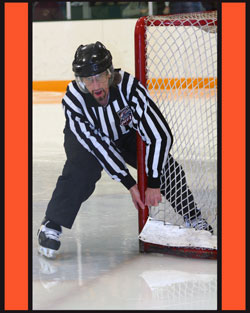
Monaco’s been a referee for the past 40 years. He’s officiated games at every level imaginable — from the mites leagues (7- to 8-year-olds) to the AAA midget level elite league (under 18s), as well as Chicago area high school hockey leagues and even a league called the Continental Hockey League, which was popular in the 1970s and into the 1980s and made up of former semipro players, some of whom were onetime NHL prospects.
“They (CHL players) didn’t make a lot of money, but these were some very high level players,” Monaco noted. “These games were wonderful and outstanding to ref.”
If you remember the 1977 movie “Slap Shot” starring Paul Newman as player-coach Reggie Dunlop, well, some of the scenes depicted in that film sometimes played out in real life in the CHL.
“These games were wonderful and outstanding to ref,” Monaco said. “They had some wild times similar to ‘Slap Shot’ — fights, bench-clearing brawls and fights in the stands. But to control game and get through it, and have the respect of coaches and fans, was a highlight of my career.”
Although Monaco has refereed contests over the years in Wisconsin, Iowa, Michigan, northern Indiana and downstate Illinois, his home base has been the Chicago area, where he developed a reputation among coaches, players and fans as being one of the game’s most knowledgeable and respected officials.
But recently, Monaco decided to hang up his whistle, striped shirt and skates, and retire from officiating. He says he’s getting out while the getting’s good with regard to his physical health.
Hockey referees, of course, try as best they can to avoid getting hit with pucks, players’ sticks, and being caught between the checks of players along the boards. Yet that can be difficult to do, given the fast pace of the game. Monaco has experienced all of the above, but he’s seen some of his officiating colleagues suffer far worse injuries: broken legs, broken cheekbones, having to get stitches after being struck with a puck or being inadvertently run over by players.
Monaco hasn’t experienced a major injury, knock on wood, and wanted to keep it that way.
“I definitely took some whacks and bruises through the years and came out of it pretty much unscathed,” he said. “Somebody has been watching over me. I’m 63, and will be 64. I’ve been at it for 40 years. I have nothing left to prove, not that I was trying to prove anything before. Before the worst happens and I suffer major injury, I just said, ‘You know, I’m 63. If I wind up with major injury, I don’t want to have to go through life in a wheel chair and not walk around and be functional. I think it’s time to call it a career.”
Monaco became interested in officiating in the early 1970s after playing for a few years with the Chicago/Skokie Chargers, a semipro team.
“I got good at it,” he recalled. “Early on I had long hair and a beard. I was a rock and roller. Officials were a straightforward group; they didn’t want long hair and a beard. But I kept my hair and beard and proved that it (being a good referee) had nothing to do with the social mores of society and hockey people.”
Eventually, he developed into such a good official that — long hair, beard and all — coaches and local hockey organizations demanded that he officiate more of their games.
“I wasn’t some wacko, long-haired guy, and I could do the job,” he said.
A few players whose high school games Monaco once officiated went on to become members of the Chicago Blackhawks: goaltender Bobby Janecyk, forward Eddie Olczyk, the analyst for Hawks’ television broadcasts, and defenseman Chris Chelios. Both Olczyk and Chelios are U.S. Hockey Hall of Famers.
As good of an official as Monaco has been, however, he’s been subjected to his share of fans yelling at him from the bleachers, as well as coaches berating him from the bench, criticizing his calls.
He dismisses their critiques.
“No referee at any level goes onto ice with mindset that ‘I’m going to screw this game up on purpose,’ Monaco said. “Officials are held to this unbelievable, outrageous standard. I tell them, ‘I didn’t trip the guy, I didn’t slash the guy, the player did it.’ I just made the call. Some people just never get the concept.
“You have to have a tough skin and a tough mentality. You have to walk away; you can’t stand there and get into a shouting match (with anyone).”
Turning the other cheek when necessary, and being a good person, are values that Monaco says were instilled in him growing up in an Italian-American family. Monaco was born in Chicago in the 69th and Ashland neighborhood.
“It was a pretty good melting pot, but it was mostly Italians,” he recalls.
Monaco’s father, Charles, served in World War II. The families of both his father and his mother, Lillian (nee Demiere), came from the Campania region of southwestern Italy. Monaco has an older sister, Marilyn, and a younger sister, Anita.
“I learned a lot about family and tradition through all the years of growing up in grammar school and high school,” he said. “I believe in always being a good guy, a generous man, and understanding. A lot of that came from the friendship and brotherhood and unity that Italians thrived on. I applied that to my life.”
While Monaco is retiring from hockey, he’s not completely retiring in the traditional sense. He’s still involved with his company — Sopro Music, Records and Films, Inc. He’s an independent music promoter, record label director and film producer, and still puts on a couple of live shows each year around the area. In the past, he worked with such bands as Grand Funk Railroad, Steppenwolf and Tommy James and the Shondells, but adds that “most of my work was with local (Chicago) bands.”
Monaco also is an author. He recently published his first book, titled, “Drafted: You’re in the Army Now!” a biography about him serving in the U.S. Army from 1969 to 1971. This summer, he’s also looking to print and publish a novel, “Riding Easy,” which was a screen play he wrote that parallels the story to the landmark counterculture film, “Easy Rider.” Plus, he’s got another novel in the works, called “The Tone King,” a story about the rise to fame and fortune of a Chicago guitarist, based on the many great guitarists Monaco has worked with throughout his music career.
Monaco’s desire to pay tribute to his fellow veterans prompted him to produce a music CD, “Hail American Heroes,” that’s been out for the past 10 years. It’s dedicated to all veterans who’ve served in World War II, Korea, Vietnam and most recently in Afghanistan and Iraq, as well as to victims of the 9/11 terrorist attacks.
The CD contains nine songs, which were collectively written, designed and produced by Monaco, Sopro executive producer Red Rose and musicians Joe Jammer, Pat Doody, Bobby Dunne, Jeff Luif and Joey Miroballi, who helped shape and also co-wrote the music. He offers it free of charge to veterans.
 Fra Noi Embrace Your Inner Italian
Fra Noi Embrace Your Inner Italian






